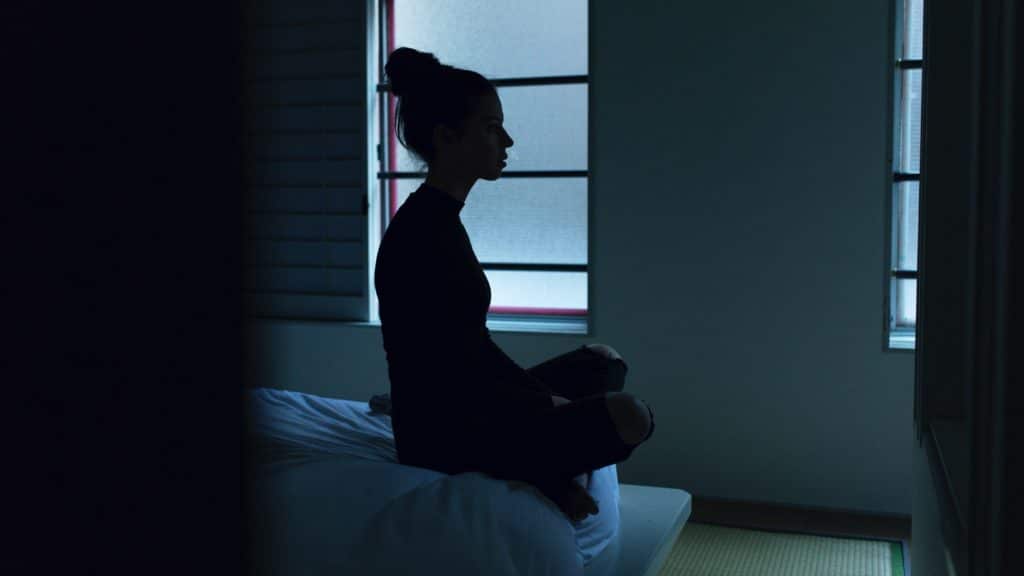What Is Sleep Anxiety?
While some of us may toss and turn some nights, every night can be a restless night for others. If you’ve ever struggled with sleep anxiety, you know the feeling of anxiously watching the clock as you worry about not being able to fall asleep and waking up sleep-deprived the next day.
Many statistics reveal Americans’ struggle to sleep regularly. As it turns out, anxiety and sleep are connected in several ways. Fifty percent of those who are sleep-deprived say that their anxiety impacts their ability to sleep at night.
It’s important to understand how anxiety can affect your ability to get a good night’s rest. This guide covers what sleep anxiety is, the effects of anxiety-induced sleep deprivation, and science-backed tips for decreasing anxious thoughts, as well as how to set yourself up for better sleep.
Sleep anxiety is a type of performance anxiety that involves a cycle of anxious thoughts before going to bed, many of which involve unease, nervousness, and worry. While there are dozens of tasks to occupy your cognitive functions during the day, your brain can often struggle to keep itself busy at night, thus resorting to any anxious emotions and thoughts.
Anxiety can lead to an endless cycle of stress and poor sleep. If you often experience nighttime anxiety, it may be hard to tell whether you’re having trouble sleeping because you’re anxious or you’re feeling anxious because you can’t sleep.

According to research, sleep and anxiety go hand-in-hand. Having anxiety can cause sleeping problems and make it difficult to sleep, but sleep deprivation can also trigger anxiety. If you’re unable to sleep, you may dread going to bed and waking up feeling even more sleep-deprived. UC Berkeley researchers suggest that the lack of sleep can ramp up regions in the brain that trigger excessive worry, which provokes further anxiety and makes sleep even more elusive.
What Are the Symptoms of Nighttime Anxiety?
Symptoms of nighttime anxiety take on many forms, as it is experienced differently by everyone. Before bedtime is no different than anxiety during the day. The difference is that you may be more aware of anxiety at night as fewer other stimuli are co-occurring.
While sleep anxiety is individual to each person, some of the most common symptoms include:
- Trouble falling and staying asleep
- Trouble concentrating
- Feelings of restlessness and nervousness
- Gastrointestinal problems
- Nightmares and night terrors
- Hypnic jerk (twitching)
Another symptom of sleep anxiety is panic attacks. This involves an episode of extreme fear that’s characterized by a sense of doom, increased heart rate, sweating, dizziness, shortness of breath, and a feeling of detachment that could occur before or during sleep. After experiencing a nighttime panic attack, there can be anxiety about getting another attack, making it harder to fall asleep.
What Happens When Anxiety Interrupts Sleep?
When anxiety causes inadequate sleep, it can go beyond the tiredness of a regular all-nighter. Anxiety can be a trigger for sleep deprivation, creating a vicious cycle that can further affect your sleep pattern.
How Can I Overcome Sleep Anxiety?
If anxiety or disrupted sleep occurs often in your day-to-day life, these simple strategies can help you relax your body and mind and ease yourself into sleep. Changing your pre-sleep habits takes time and patience, but adapting to these changes may help you fall asleep with less sleep anxiety over time.
1. Practice Good Sleep Hygiene
Engaging in proper sleep hygiene can help get better sleep. If you have a routine and engage in appropriate sleep hygiene consistently, your mind will be less likely to go down the rabbit hole of anxious thoughts.
Sleep hygiene refers to various habits that are necessary for good sleep quality. To practice good sleep hygiene you can:
- Limiting screen time before bed
- No major physical activity or heavy meals close to bedtime
- No caffeine or alcohol near bedtime or after a certain time in the afternoon
Other easy ways to practice good sleep hygiene include:
- Soaking up the morning sun
- Limiting power naps to 20 minutes
- Keeping your bedroom dark and cool
- Following a consistent bedtime routine

2. Practice Meditation
Practicing meditation can help calm sleep anxiety. Additionally, research has shown that diaphragmatic breathing relaxation techniques can lead to significant reductions in sleep anxiety.
Start with as little as a few minutes of sitting quietly and focusing on your breathing. Learning to silence your mind and meditate can help navigate stress during the day and before bedtime. If you have trouble meditating, try this relaxing yoga poses to help your body prepare for sleep.
3. Exercise
Using exercise to calm pre-bedtime anxiety reduces the production of stress hormones. Regular exercise has been shown to help people fall asleep faster and more soundly. Even a moderate-intensity workout like a brisk walk can improve sleep for those with chronic insomnia.
While getting exercise can be a great way to practice good sleep hygiene, Dr. Howard LeWine, editor in chief of Harvard Men’s Health Watch, says, “You should avoid vigorous activity for at least one hour before bedtime.” If you’ve been struggling to fall asleep, you may want to skip the late-night sweat sesh and opt for a morning or afternoon workout instead.
4. Set Aside Time for Winding Down
If you’ve been struggling with sleep anxiety, Dr. Fran Walfish, a family and relationship psychotherapist, suggests “creating a routine that winds you down and gets you in the mood for sleep.” This can include things like dimming the lights, listening to calming music, or taking a warm bath. Walfish also suggests opting for activities like light reading in place of a TV or computer, as using a screen can “ tend to rev up anxiety and excitatory thresholds versus relax and calm you down.”
The best nighttime routine allows your mind and body time to slow down before you turn off the lights. Allot at least 30 minutes to take a bath, read a book, listen to a podcast, or play quiet music. These “transition rituals” can condition your brain to associate certain actions with preparing for sleep.
5. Avoid Stressful Activities Before Bed
Creating some form of transition from daytime to sleeping is highly recommended. You can’t expect the mind to go to sleep on demand. Instead, you need to allow time for the brain to transition, just like we transition to go outside or when we get home. The goal is to reduce the nervous thoughts in your head so your mind is clear, calm, and positive before you head off to sleep. This can entail leaving the office, work, news, and social media exchanges for earlier in the day to create buffer time between work and sleep, setting yourself up for better rest.
6. Write Down Your Worries on Paper
Putting your thoughts down on paper can help us remain accountable to ourselves, our feelings, our purpose, and our plan. Instead of letting thoughts and to-dos swirl around in your brain, write them down so that your brain has a game plan for the following day. Wells says that writing down your anxious feelings, especially through stream-of-consciousness journaling (writing whatever comes to mind), can help with sleep anxiety.
In addition to calming pre-bedtime anxiety, research shows that journaling can also help you fall asleep more quickly. To get started journaling, just snuggle up with your notebook and some cozy pillows and let your thoughts take it away.
7. Avoid Lying in Bed Awake
If you’re lying in bed for more than 20 minutes and still can’t fall asleep, it might be time to give yourself a do-over. While it may feel counterintuitive, Lawson suggests leaving your bedroom to do a sleep-inducing activity, like having a cup of tea or reading a book. This conditioning, known as stimulus control, can reduce the time it takes to fall asleep. If you’re going to try stimulus control, it’s important to remove yourself from your bedroom environment. This helps give you a mental reset when you try to fall asleep again.
8. Limit Screen Time
Did you know that our laptops, phones, and tablets emit blue light that tricks the brain into thinking the sun is up and suppresses melatonin? To combat this, try avoiding screens for one to two hours before bedtime to minimize sleep anxiety and interruptions. If you’re unable to part ways with your phone before going to bed, you should consider using a blue light filter to minimize the amount of stimulating blue light you see before trying to hit the hay.
9. Set Your Environment
Controlling light, sound, and temperature in your bedroom can increase your chances of calming your mind and falling asleep easily. A sleep-friendly environment should be quiet, dark, and cool — between 60 to 67 degrees Fahrenheit, to be exact. If the light is keeping you up, using a dimmable glow light can be a great way to get yourself in the mood for sleep. Additionally, while white noise may be your go-to background sound to fall asleep, research has shown that pink noise can also help make it easier to focus on your sleep.

10. Get a Bed That Fits You
When you sleep on an uncomfortable mattress, pressure points build up on your body, causing you to toss and turn. A supportive mattress and pillow provide support to the contours of your body and neck and keep you cool and comfortable for sleep.
Reclaim Your Life From Sleep Anxiety
Having anxiety can cause sleeping problems and make it difficult to sleep, but sleep deprivation can also trigger anxiety. We Level Up California can provide to you, or someone you love, anxiety treatment with professional and safe care. Feel free to call us to speak with one of our counselors. We can inform you about your condition and provide answers and relevant information to all your questions. Our specialists know what you are going through. Please know that each call is private and confidential.